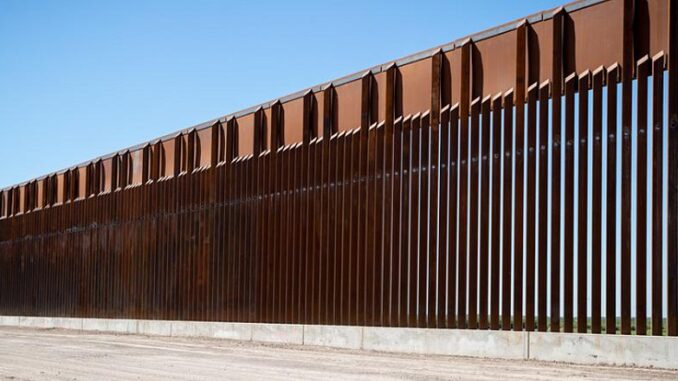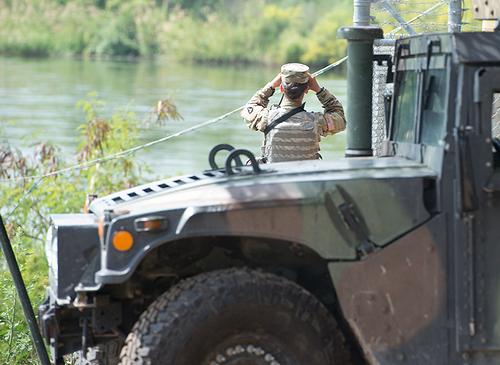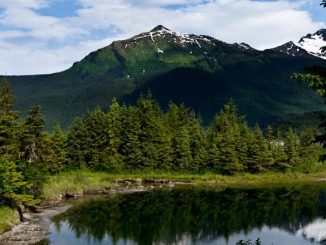
WASHINGTON, DC, October 6, 2023 (ENS) – On his Inauguration Day, January 20, 2021, one of the first things Joe Biden did as President was to deliver a Proclamation lifting his predecessor’s 2019 declaration of an emergency at the U.S. southern border with Mexico, used to justify building a border wall.
“Like every nation, the United States has a right and a duty to secure its borders and protect its people against threats. But building a massive wall that spans the entire southern border is not a serious policy solution,” said the new president, a Democrat. “It is a waste of money that diverts attention from genuine threats to our homeland security.”
“My administration is committed to ensuring that the United States has a comprehensive and humane immigration system that operates consistently with our nation’s values. In furtherance of that commitment, I have determined that the declaration of a national emergency at our southern border … was unwarranted,” Biden said.
From 2017 through January 2021 under President Donald Trump, a Republican, federal agencies built about 450 miles of barriers along the U.S.-Mexico border. To expedite construction, they waived federal environmental and other laws. The construction harmed cultural and natural resources, for example, by blasting at a tribal burial site and altering water flows,” the U.S. Government Accountability Office said in a September 2023 report. https://www.gao.gov/products/gao-23-105443
“It shall be the policy of my Administration that no more American taxpayer dollars be diverted to construct a border wall. I am also directing a careful review of all resources appropriated or redirected to construct a southern border wall,” he proclaimed on his first day in office.
President Biden never wanted the border wall, but on Monday, he was forced to use money already appropriated by Congress to build 20 miles of wall in Starr County, on the southern tip of Texas in the valley of the Rio Grande, the river that forms the border between Texas and Mexico.
The construction will be funded by a congressional appropriation passed in 2019, in which Congress set aside funding for the construction of a border barrier in the Rio Grande Valley. The Department of Homeland Security, DHS, is required to use those funds for the appropriated purpose.
The Starr County area is experiencing “high illegal entry,” the Department of Homeland Security, DHS, said in a statement Thursday on the U.S. Federal Registry.
U.S. Customs and Border Protection statistics show that the Rio Grande Valley Sector had nearly 300,000 encounters with migrants in Fiscal Year 2023, which ended Sept. 30.
The U.S. government does not want to build new sections of wall on its border with Mexico, Mexican President Andres Manuel Lopez Obrador said on Friday at a press conference after the Biden Administration announced it would build more sections of border wall.
A high-ranking delegation of U.S. officials met Thursday with their Mexican counterparts, among them U.S. Secretary of State Antony Blinken.
“They don’t want to build more sections of the wall, that’s what they told us,” the Mexican president said.
Starr is the county with the highest proportion of Hispanics in the continental United States. According to the 2020 Census, 97.7 percent of the county’s 66,000 residents identify as Hispanic or Latino.
Starr County has long been a strongly Democratic county. No Republican presidential candidate has won the county since 1892, the longest Democratic winning streak in the country.
Now Starr County residents, who had wanted to keep their county barrier-free are disappointed, in part because 26 federal laws that protect clean air and water, wildlife, public lands and historic sites are being waived to expedite construction. This is the first time the Biden Administration has waived environmental laws.

Starr County Judge Eloy Vera told the local publication “Border Report” on Thursday from his offices in the county seat of Rio Grande City, “When the Biden administration took over they said, ‘we’re not going to build a single foot of wall anymore’ and now all of a sudden we find out that they are. And not only are they going to build; they waived a bunch of laws to get it done quicker, and that was kind of disappointing because we felt we should have been given more lead time.”
The Biden Administration is reaching out to reassure Starr County Democrats that once this section of the border wall is built, there will be no more construction on his watch.

Secretary of Homeland Security Alejandro Mayorkas said Thursday, “There is no new Administration policy with respect to border walls. From day one, this Administration has made clear that a border wall is not the answer. That remains our position and our position has never wavered. The language in the Federal Register notice is being taken out of context and it does not signify any change in policy whatsoever.”
“The construction project reported today was appropriated during the prior administration in 2019 and the law requires the government to use these funds for this purpose, which we announced earlier this year,” said the secretary.
“We have repeatedly asked Congress to rescind this money but it has not done so and we are compelled to follow the law,” Mayorkas said.
“This Administration believes that effective border security requires a smarter and more comprehensive approach, including state-of the-art border surveillance technology and modernized ports of entry,” said Mayorkas. “We need Congress to give us the funds to implement these proven tools.”
Still, this part of the barrier wall is going ahead, and the 26 federal laws that are being waived fall into three groups:
Laws Covering Land, Air, Water and Waste
- the National Environmental Policy Act, Jan. 1, 1970
- the Administrative Procedure Act
- the Comprehensive Environmental Response, Compensation, and Liability Act
- the Clean Air Act
- the Farmland Protection Policy Act
- the Federal Water Pollution Control Act, known as the Clean Water Act
- the Federal Land Policy and Management Act
- the National Trails System Act
- the Noise Control Act
- the Safe Drinking Water Act
- the Solid Waste Disposal Act
Laws Covering Wildlife
- The Endangered Species Act of Dec. 28, 1973
- the Migratory Bird Treaty Act
- the Migratory Bird Conservation Act
- the Eagle Protection Act
- the Fish and Wildlife Coordination Act (became law on March 10, 1934)
- the National Wildlife Refuge System Administration Act
- the National Fish and Wildlife Act of 1956
Laws Covering Historic Preservation, Graves
- the Antiquities Act
- the Archaeological and Historic Preservation Act
- the Archeological Resources Protection Act
- the Historic Sites, Buildings, and Antiquities Act
- the National Historic Preservation Act
- the Paleontological Resources Preservation Act
- the Native American Graves Protection and Repatriation Act
- the American Indian Religious Freedom Act
Conservation groups are objecting to the waivers of these federal protective laws, warning that they will degrade the environment.
The Center for Biological Diversity, CBD, a national nonprofit based in Arizona, says the new border wall construction will impact fragile habitat near the Lower Rio Grande Valley National Wildlife Refuge.
The Refuge was established to protect the 1,200 species of plants, 300 butterflies, and 700 vertebrates, including at least 520 birds that inhabit the lower Rio Grande Valley.
“It’s disheartening to see President Biden stoop to this level, casting aside our nation’s bedrock environmental laws to build ineffective wildlife-killing border walls,” said Laiken Jordahl, Southwest conservation advocate at the Center for Biological Diversity.
“Starr County is home to some of the most spectacular and biologically important habitat left in Texas and now bulldozers are preparing to rip right through it. This is a horrific step backwards for the borderlands,” Jordahl said.

The CBD warns that wall construction in Starr County could harm recovery plans for endangered ocelots, which depend on contiguous wildlife corridors of protected habitat along the Rio Grande.
The U.S. Fish and Wildlife Service says it is concerned about potential extinction of the ocelot, whose numbers have dwindled to fewer than 50 in the United States.
While the ocelot is widely distributed from Mexico through Central and South America, the U.S.-Mexico border wall restricts its movement. The ocelot has also lost much of its thorn forest habitat in southern Texas to expanding transportation infrastructure and urban development.
Two endangered plants, the Zapata bladderpod and prostrate milkweed, are endemic to the area and will likely also be threatened by wall construction with their protections stripped by the waiver, the CBD warns.
Last month, the U.S. Government Accountability Office released a report https://www.gao.gov/products/gao-23-105443 detailing the severe damage the border wall already has caused to wildlife, public lands, and Indigenous sacred sites and burial grounds along the U.S.-Mexico border.
Beyond jeopardizing wildlife, endangered species and public lands, the U.S.-Mexico border wall is part of a larger strategy of ongoing border militarization that damages human rights, civil liberties, native lands and international relations, according to the Center for Biological Diversity, which says, “The border wall impedes the natural migrations of people and wildlife that are essential to healthy diversity.”
The nonprofit public interest environmental law organization Earthjustice believes that the waivers are a grave mistake.
Earthjustice Vice President of Policy and Legislation Raul Garcia said, “It is disappointing to see the same policies that hurt so many communities and ecosystems in the last administration being repeated by the current one.”

“Trump’s border wall remains one of the most hated and divisive acts of his time in office,” Garcia said. “It was based on the racist policies of former President Trump and extremist Republicans and has since resulted in irreparable harm to endangered species and habitats, the destruction of Indigenous sacred sites, and increasingly militarized border communities. By waiving bedrock environmental laws meant to protect communities, vibrant ecosystems, and cultural resources, Trump’s hastily constructed wall has further burdened border residents with more flooding, more erosion, and more unnecessary pollution.”
“The Biden Administration is repeating these same mistakes. Environmental laws exist for a reason, and waiving them to further ineffective policies will continue setting a dangerous precedent for future projects. A border wall will never be an effective solution to our immigration challenges, and we stand shoulder-to-shoulder with border communities who have continued to fight this disastrous policy for decades,” Garcia said, calling on the Biden Administration to “reverse this incredibly short-sighted decision.”
Founding President and CEO Mark Magaña of the national nonprofit GreenLatinos’ said in a statement that the Latino community “is left reeling over the unconscionable decision” from President Joe Biden’s Department of Homeland Security. … We’re appalled that our comunidad [community] and madre tierra [mother earth] were cast aside to continue constructing the Trump border wall.”

“We do not forget that in 2020, Joe Biden campaigned on not building another foot of Trump’s border wall,” he said.
“This disastrous decision not only continues a legacy of xenophobia and racism left by the previous administration but is also a slap in the face to Latino/a/e communities who live, work, and play in the southern border region. By moving forward with this new order, this administration makes it loud and clear that they intend to propagate the continued marginalization of our people but also discard the hard work our ancestors have done as devoted stewards of the lands they call home.”
“We will stand firm against this decision and call for an immediate reversal of this decision,” Magaña said. “We will tirelessly stand up against all those who seek to divide us with destructive border walls rather than unite us – and continue to defend our families, children, health, land, waters, and environment from further degradation.”
Featured image: U.S.-Mexico border wall near McAllen, Texas with infrastructure that includes all-weather access roads. October 30, 2020 (Photo by Jerry Glaser courtesy U.S. Customs and Border Protection)
© 2023, Environment News Service. All rights reserved. Content may be quoted only with proper attribution and a direct link to the original article. Full reproduction is prohibited.



